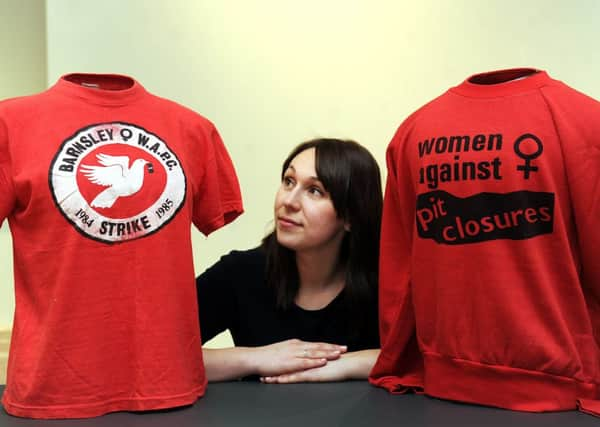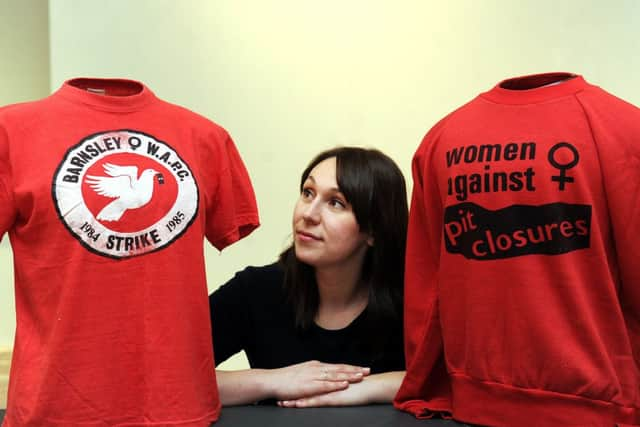Video: A strike that defined the lives of women


Thirty years on from the start of the action, the key role women played by finding their voice en masse to make a stand against the proposed closure of mines that would ultimately cost their families their livelihoods, is being commemorated at a new exhibition.
‘Coal Not Dole’ is now open at the Experience Barnsley museum until June and is the first in a series of events which will run at the museum until next March to mirror the timeline of the 1984/85 strike. It tells the tale of the miner’s strike through the stories of Barnsley women who formed their own powerful group to support the striking miners and their families.
Advertisement
Hide AdAdvertisement
Hide AdThousands of miners faced job losses from pit closures, but Barnsley’s women fought back with a campaign - Women Against Pit Closures - that gained international support. Their role is a story of struggle, hardship and friendship, and the new exhibition explores the impact it had on their lives, up to the present day.


Jemma Conway, the museum’s community heritage co-ordinator, said: “From the beginning it was women who took charge and became very vocal about the situation. A lot of the women who we have interviewed had lived through the strike in the 70s and so when the strike occurred again in the 80s, they came together quickly.
“It started with a few women at Northern College at Wentworth Castle who started to rally people to come together. There was no one leader of the movement as such, and these beginnings led to a lot of different groups of women coming together across Barnsley.”
Probably the most well-known members of the movement are Anne Scargill, the then wife of Arthur Scargill, president of the National Union of Mineworkers, and accomplice Betty Cook who were among those who started the campaign.
Advertisement
Hide AdAdvertisement
Hide AdOn the 12 March 1984, Women Against Pit Closures took part in a big rally at Barnsley Civic Hall. Newly empowered by the call to action, women attended the event from across the country to show solidarity.
And there was more to their role than joining picket lines, Jemma continues: “In Barnsley there were lots of different groups running soup kitchens and fundraising. For a lot of the women, they had never done anything like it before and, in their own words, it took them away from the kitchen sink and gave them the opportunity to speak on public platforms for the very first time.
“These groups did things like setting up food kitchens, fundraising for miners’ support groups, spoke at rallies and joined the picket lines - a lot of them were arrested. Almost every village in the area had a campaign group.”
A new chapter had begun for a generation of local women and the lives of many changed profoundly as a result.
Advertisement
Hide AdAdvertisement
Hide Ad“These women had lived through the strikes in the 70s and they didn’t want to live through the same thing again without doing something about it and I think there are a lot of people who look back at the strikes in the 80s with affection and feel a sense of loss.
“A lot of the women I have spoken to said the strikes liberated them in a way they had never experienced before. They found their voice and travelled outside of Yorkshire to rally support for what was happening. They went to Ireland and as far afield as Italy.
“For a lot of these women they found that their lives were changed afterwards. They felt a new sense of independence and freedom. A lot got divorced.
“Before the strikes these women would have been stay-at-home housewives and a lot of women didn’t want to go back to that and instead many went on to go into education. “A lot of the women I have spoken to said they wouldn’t have missed it for the world - it gave them a new perspective.”
An eye opening experience
Advertisement
Hide AdAdvertisement
Hide AdTo help tell the story of the role women played in the South Yorkshire miners’ strike of the 80s, a panel of young people were drafted together to interview some of those who played an active role as members of Women Against Pit Closures.
Drawn from the membership of Barnsley Youth Council and regular visitors to Experience Barnsley, six young people amassed the material for a showreel of interviews which is a key feature of the exhibition.
Among the other exhibits is archive film footage of women speaking in public during the height of the strike in Barnsley, minute books from the group’s meetings and protest materials such as stickers and banners.
Coal Not Dole runs until Sunday 1 June. Admission is free.